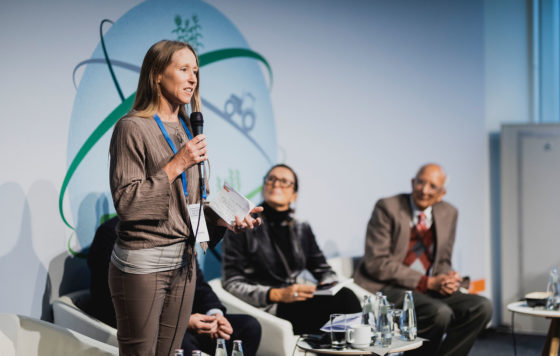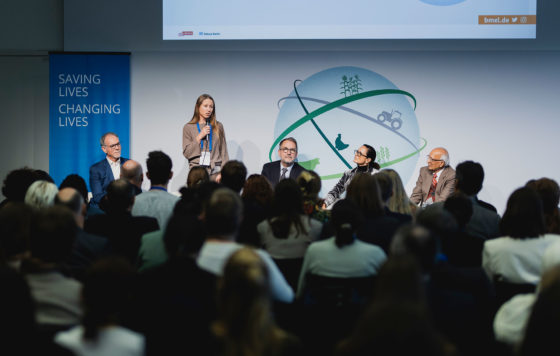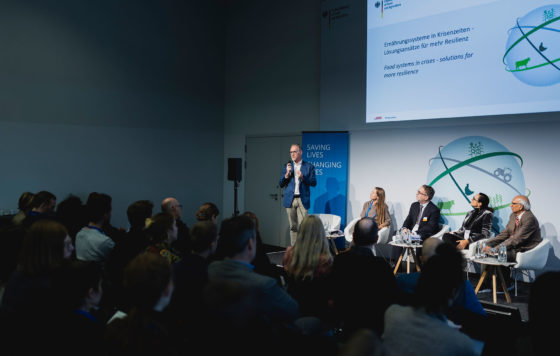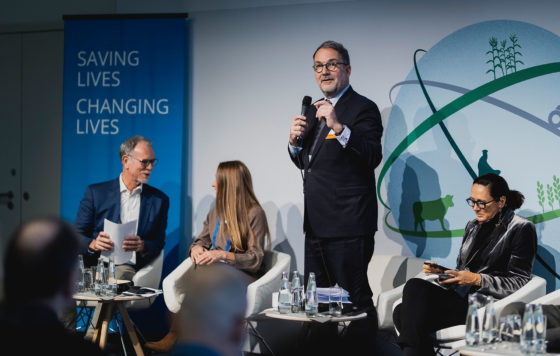Food systems in crises – solutions for more resilience
United Nations World Food Programme (WFP)
Time: Friday, 20. January 2023, 09:30 a.m. – 11:00 a.m.
Room: M6-M7
Languages: English, German
Summary:
The panel highlighted the central yet often overlooked role of soil in creating climate resilient and inclusive food systems. Prof. Rattan Lal, Distinguished Professor of Soil Science and Director of the CFAES Rattan Lal Center for Carbon Management and Sequestration at the Ohio State University made the case in his presentation that “Healthy Soils = Healthy Diets = Healthy People = Healthy Ecosystems = Healthy Planetary Processes”. He highlighted how the war on Ukraine tragically destroys and degrades some of the world’s best soils. Sandrine Dixson-Decleve, Co-President of the Club of Rome, underlined that to fix the broken food system and ensure the human right to food, a systems approach is required that empowers farmers and includes local communities, women, and indigenous people. Dr. Leigh Ann Winowiecki, Global Research Leader for Soil and Land Health at World Agroforestry (ICRAF) showcased how science can be translated into action to enhance soil health in various contexts. Mr. Joao Campari, Global Food Practice Leader at WWF International, shed light on the broken aspects of our food systems and its impact on nature, climate, and thus our planet. The panel was moderated by Dr. Martin Frick, WFP Director Global Office Germany and Brussels who made it clear that we must go beyond humanitarian assistance and build food security from the bottom up and start with our soils. Farmers are the agents of environmental change and must be at the core of our efforts to transform food systems.
Podiumsgäste
Recognitions and previous positions include: Sandrine recently published “Quel Monde Pour Demain” lucpire editions 2021 and “Earth for All: A survival guide for humanity”. 2022 She was recognised by GreenBiz as one of the 30 most influential women across the globe driving change in the low carbon economy and promoting green business. She has spent her career working with and bringing together business leaders, policy makers, academia and NGO’s to unpack complex challenges.
Until recently, Sandrine was on the European Commissions Sustainable Finance Platform and Sustainable Finance Taxonomy Expert Group, Assembly Member, Climate Mitigation & Adaptation Mission (European Commission, DGR&I) and chaired the UCL Bartlett School of Environment Energy & Resources Advisory Board. She was Chief Partnership Officer for UNSEforAll, and Director of the Prince of Wales’ Climate Leaders Group and the European Office of CISL. Over her 33 year career, she has advised HRH The Prince of Wales, Members of the European Parliament, European Commission President’s, Commissioners and officials, Governments in Asia, Africa and the Middle East, international organizations (OPEC, ADB, OECD, UNEP, USAID, UNFCCC, IEA) and business leaders of large international, European and African companies. Sandrine was Vice Chair, European Biofuels Technology Platform 2008-2016; Board member, We Mean Business 2014-2016 and the Sustainability Advisory Board of the Oil and Gas major Sasol from 2007-2010. She was also a Member of The Guardian’s Sustainable Business Advisory Board. She continues to advise policy and business leaders from across the globe.
Education:
• M.Sc., Environmental Sciences with honours, Université Libre de Bruxelles
• B.A. International Relations with honours & B.A. French with honours, University of California at Davis, California, U.S.A
• Courses on European Integration Law and Economics, l’Institut d’Études Européenne Université Libre de Bruxelles, Belgium
Speaking engagement and Publications:
TED Countdown and TEDx: The Sustainable Future series. Sandrine recently released a joint intergenerational book on the future “Quel Monde Pour Deman” lucpire éditions and has published reports, numerous articles, OpEd’s, book chapters and given presentations and lectures on planetary and climate tipping points, the Planetary Emergency, well being and new economic models, green growth and competitiveness, energy, sustainable development, transport, conventional and alternative fuel quality legislation as well as on trade & environment.
Languages: French (Mother tongue); English (Mother tongue); Spanish (Basic)
Moderation






